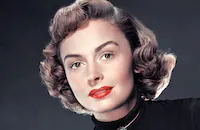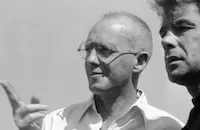The Last Time I Saw Paris

Brief Synopsis
Cast & Crew
Richard Brooks
Elizabeth Taylor
Van Johnson
Walter Pidgeon
Donna Reed
Eva Gabor
Film Details
Technical Specs

Synopsis
American Charles Wills returns to Paris, after a two-year absence, to see his daughter. He stops for a drink at a café owned by his old friend Maurice and reminisces about the days near the end of World War II: On VE Day, Charles, a reporter for The Stars and Stripes , is among the Americans celebrating in the streets with the joyous French citizens. He ducks into Maurice's café, where he encounters his friend, Claude Matine, and is introduced to American Marion Ellswirth, who has been in France throughout the war. Marion takes the men to a party thrown by her father James, a charming rascal with a talent for living beyond his means. Charles' eye is caught by Marion's beautiful, vivacious sister Helen, and the young woman stuns him with her description of the family's decadent lifestyle. Marion grows jealous as Helen flirts with Charles, and makes an appointment to meet him later. However, Helen learns about their assignation and shows up in Marion's place, and amid the victory festivities, they kiss. When Helen later comes down with a bad flu after being out in a storm, Charles visits her in the hospital, and they decide to marry. Helen wishes to stay in France, so Charles takes a job with a Paris news agency. Marion, who is still in love with Charles, soon announces her engagement to Claude. Charles and Helen marry, move in with James and have a daughter, Vicki. Charles devotes all his spare time to his writing, but after completing two novels is still unable to find a publisher. By 1950, Charles has grown despondent over his lack of success as an author, and tired of Helen's frivolous, often outlandish behavior. One night, Charles is assigned to interview socialite Lorraine Quarl, who is in Paris finalizing her most recent divorce. They spend the evening together, and when Charles returns home in the morning, Helen's lack of suspicion nettles him. Marion calls with the news that one of James's supposedly worthless oil leases, which he gave Charles and Helen as a wedding gift, has paid off. The family celebrates its newfound wealth with extravagant purchases and parties, and Charles quits his job to concentrate on his writing. Charles' third novel is also rejected, however, and he falls into a deep depression and bitterly declares himself a failure. One night, James invites Paul Lane, a suave "international tennis bum," to attend a party with them. At the party, Paul flirts with Helen, and the inebriated Charles encounters Lorraine, who is now divorcing her fifth husband. Helen asks her husband to take her home, but he insists on taking Lorraine for a drive instead. The following day, Helen treats the badly hung-over Charles coldly, despite his assurances that nothing happened between him and Lorraine. Helen admits that she joined Paul for a nightcap at his hotel and was strongly tempted to have an affair with him. She then tells Charles she is unhappy and asks to go back to America. Charles, who has been seduced by the decadence that Helen now finds unfulfilling, refuses. Instead, he takes Lorraine to Monte Carlo to compete in an automobile race. When they return to Paris, they find Helen at Maurice's café with Paul, and Charles takes a swing at him. Paul takes Helen to his hotel and declares his love for her, but makes it clear that he wishes her to stay with her husband and keep him on the side, pointing out that half the people in her social circle have such "arrangements." Disgusted, Helen walks out and returns home, but is unable to get into the house because Charles has chained the door and passed out, drunk. Helen walks through the snow to Marion and Claude's house, then collapses. Helen is hospitalized, and when the apologetic Charles visits, she asks him to take care of Vicki, and dies. Marion sues for custody of Vicki, and the grief- and guilt-stricken Charles yields without a fight, wishing only to return to America. Back in the present, Charles tells Maurice that the oil wells dried up a year before. Charles then goes to visit James, and is surprised to find him in a wheelchair, the victim of a stroke. James commends Charles on the book he has published, calling it very honest. After being reunited with his daughter, Charles tells Claude and Marion that he wants to take Vicki back with him, but Marion bitterly rejects his emotional appeal. After Charles leaves, shattered, Claude accuses Marion of still being angry that Charles chose Helen over her. Later that evening, Charles is at Maurice's café when Marion comes in and says Helen would not have wanted him to be alone. She takes him outside, where Claude and Vicki are waiting. As Claude and Marion exchange a warm glance, Charles and his daughter walk hand in hand down the boulevard.

Director

Richard Brooks
Cast

Elizabeth Taylor

Van Johnson

Walter Pidgeon

Donna Reed

Eva Gabor

Kurt Kasznar
George Dolenz
Roger Moore

Sandy Descher
Celia Lovsky

Peter Leeds

John Doucette
Odette
Luis Urbina
Gilda Fontana
Christian Pasques
Steve Mitchell
Don Kennedy
Dick Simmons
Jim Hyland
Ed Hinton
Richard Emory
Steve Wayne
Alvin Greenman
Albert D'arno
Peter Bourne
Norman Du Pont

John Farrow
Tao Perchon
Louise Colombet
Paul Mcguire
Loulette Sablon
Ann Codee
Louis Mercier
Lomax Study
John Damler
Angela Stevens

Paul Dubov
Fay Roope
Alberto Morin
Art La Forest
Andre Simson
Jean Heremans
Josette Deegan
Mary Ann Hawkins
Manuel Paris
Gabor Curtiz
Marcel De La Brosse
Max Barwyn
Leonidis Ossetynski
Maya Van Horn
Bruno Vesoto
Harry Cody
Matt Moore
Paul Power
Joe Rubino
Gene Coogan
Arthur Dulac
Jean Del Val

Jacqueline Allen
Peter Camlin
Crew
Richard Brooks
Saul Chaplin
Jack Cummings
Randall Duell
John Dunning
Alvord Eiseman
Julius J. Epstein
Philip G. Epstein
Cedric Gibbons
A. Arnold Gillespie
Sydney Guilaroff
Oscar Hammerstein Ii
Conrad Kahn
William Kaplan
Alexander Kelly Jr.
Jerome Kern
Kendrick Kinney
Wesley C. Miller
Jack D. Moore
Helen Rose
Joseph Ruttenberg
Conrad Salinger
William Shanks
Jack Martin Smith
William Tuttle
Finn Ulback
Edwin B. Willis
Fred A. Young

Photo Collections
Videos
Movie Clip


Trailer
Hosted Intro
Film Details
Technical Specs

Articles
The Last Time I Saw Paris
A leading lady of beauty, charm and warmth, Reed never quite became a full-fledged movie star; she seemed to lack the requisite fire and ambition. But she would find her niche in television, where her sitcom The Donna Reed Show became a long-running hit.
In The Last Time I Saw Paris (1954), inspired by the F. Scott Fitzgerald story Babylon Revisited, Reed plays one of two sisters in post-World War II France who both fall for a visiting writer (Van Johnson).
Unfortunately for Reed, the other sister is played by the 22-year-old Elizabeth Taylor, who was in the full bloom of her youthful beauty and captured most of the audience sympathy as a tempestuous but warm-hearted playgirl who comes to a tragic end. Taylor would say later that this was the role that revitalized her interest in acting after too many roles in which she served a purely decorative purpose. The film marked Taylor's first teaming with director Richard Brooks, who would later guide her through her signature role as Maggie in Cat on a Hot Tin Roof (1958).
It is obvious in The Last Time I Saw Paris that Taylor is the performer who has captured Brooks' imagination. Reed's main function in the film is to watch jealously from the sidelines as Johnson and Taylor enter into a troubled marriage plagued by his thwarted ambitions and drinking problem, and her flightiness and delicate health. As the grim and embittered Marion, who has married someone else on the rebound, Reed even tries to take Johnson's only child away from him.
Still, Reed acquits herself professionally and, at the time, won some positive critical notice, including this comment from Philip T. Hartung in Commonweal: "Donna Reed is excellent as the sister who carries a secret yen for Van through the years and is now intent on making him suffer for his indiscretions. Hers is the most interesting role in the film and I'm sorry it was not developed more fully."
Producer: Jack Cummings
Director: Richard Brooks
Screenplay: Julius J. Epstein, Philip G. Epstein, Richard Brooks, from story "Babylon Revisited" by F. Scott Fitzgerald
Cinematography: Joseph Ruttenberg
Art Direction: Randall Duell, Cedric Gibbons
Original Music: Conrad Salinger, Charles Trenet
Editing: John Dunning
Costume Design: Helen Rose
Cast: Elizabeth Taylor (Helen Ellswirth/Wills), Van Johnson (Charles Wills), Walter Pidgeon (James Ellswirth), Donna Reed (Marion Ellswirth/Matine), Eva Gabor (Mrs. Lorraine Quarl), Kurt Kasznar (Maurice), George Dolenz (Claude Matine), Roger Moore (Paul Lane).
C-117m. Closed captioning. Letterboxed.
by Roger Fristoe

The Last Time I Saw Paris
Quotes
Trivia
The film is loosely based upon F. Scott Fitzgerald's short story "Babylon Revisited".
Notes
The working title of this film was Babylon Revisited. F. Scott Fitzgerald's short story, written in 1931, was set among American expatriates living in Paris after the excesses of the 1920s, the "Roaring Twenties," and the devastation of the Depression. The character of "Helen" is referred to, but does not appear in the short story. Although the film was copyrighted in 1954, the entry in the copyright book states "in notice: 1944," possibly due to a typographical error in the cutting continuity submitted.
The rights to Fitzgerald's story originally belonged to independent producer Lester Cowan, who had plans to produce it with his partner, Mary Pickford, according to a December 1946 Hollywood Reporter news item. Cowan sold the rights to Paramount in 1951, and a December 17, 1951 Daily Variety news item reported that Bernard Smith would produce the film and that screenwriters Julius and Philip Epstein would co-direct. The Last Time I Saw Paris marked Philip Epstein's last release; he died in February 1952. In November 1952, Variety reported that William Wyler would direct the film for Paramount, with Gregory Peck as "Charles Wills." M-G-M acquired the film rights from Paramount in 1953.
February and May 1954 Hollywood Reporter news items include Carlos Thompson and Murray Pollack in the cast, but their appearance in the final film has not been confirmed. Portions of the film were shot on location in Paris and Nice. Hollywood Reporter production charts indicate that background filming took place in Paris in late March 1954, although principal photography did not begin until mid-Apr. Jack Martin Smith is listed as art director in the first production chart only. The Last Time I Saw Paris marked the American film debut of British actor Roger Moore (1927-). Moore was under contract to M-G-M, then Warner Bros., in the late 1950s to early 1960s. He then returned to England, where he starred in the popular television series The Saint, which ran from 1963 through 1966 on CBS and from 1967 through 1969 on NBC. Moore went on to star in seven of the James Bond films in the 1970s and 1980s.

Miscellaneous Notes
Released in United States Fall November 1954
Released in United States Fall November 1954















